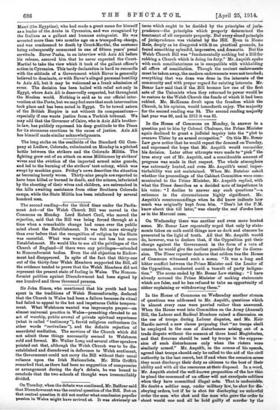Sir John Simon, who mentioned that his youth bad been
spent in the traditions of Welsh Nonconformity, declared that the Church in Wales had been a failure because its ritual bad failed to appeal to the hot and impetuous Celtic tempera- ment. What Welshmen wanted was impromptu prayer—an almost universal practice in Wales—preaching elevated to an act of worship, public avowal of private spiritual experience (what is called " testimony "), fervid religions enthusiasm (in other words "revivalism"), and the definite rejection of sacerdotal mediation. The services of the Church which did not admit these things necessarily seemed to Welshmen cold and formal. Mr. Walter Long and several other speakers pointed out that, although the Welsh Church was to be dis- established and disendowed in deference to Welsh sentiment, the Government could not carry the Bill without their usual reliance upon the Irish Nationalists. Mr. Ellis Griffith remarked that, as there had been no suggestion of compromise or arrangement during the day's debate, he was bound to conclude that the two schools of thought were irreconcilably divided.


























































 Previous page
Previous page